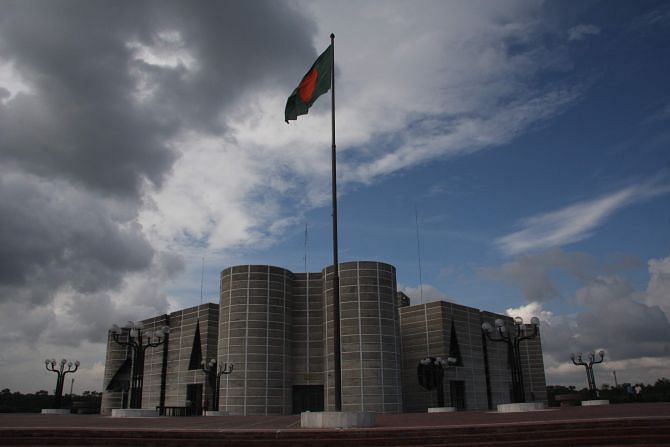Time to change script
Time to change script

FOCUS on a recent set of incidents in Indian politics. You discern a certain vibrancy in the relationship between the opposition and the government in Lok Sabha. And note that BJP's overwhelming mandate has made little difference in its equations with the other side which hasn't been orphaned at all.
What proved quite uproarious in Lok and Rajya Sabhas - for the curious readers - was what Union Minister of State for Food Processing Industries Sadhvi Niranjan Jyoti said in Hindi which translated into something like this in English: “You have to decide if you want a government in Delhi to be led by children of Lord Ram or illegitimate children.”
Result: She had to tender apologies before both Houses of Parliament with identical wordings. Even though she had made those remarks at a public rally and not in the parliament, she could take the plea of “a slip of tongue.” But then she had to live up to parliamentary norms as an MP. What's particularly noteworthy is that she was directed to apologise before parliament by no less a person than Prime Minister Narendra Modi himself. Still the opposition didn't cool it demanding her removal from state ministership.
It just did not raise a hue and cry over the state minister's abusive remark, it put across the floor of the House a 15-point list of BJP promises that the ruling party had 'reneged on.' Rahul Gandhi gave a lead to it.
By contrast, how many ministers in Bangladesh ha ve apoligised for their abusive remarks, including Latif Siddique for that matter? Remorse and regret are unknown in our politics.
The potential opposition conglomerate is not to be trifled with, and this for two reasons: One, with the National Democratic Alliance (NDA), led by the Bharatiya Janata Party (BJP) having 336 seats, the remainder 207 seats present a significant opposition voice. Two, in the skewed electoral system -- first past the post -- BJP won 31% percent of all votes, conjuring up a large percentage of ballots cast for other camps.
What British Prime Minister Benjamin Disraeli said in 1868 holds good even to this day as a testament of democracy: “No government can be long secure without a formidable opposition.” Conversely, no government is safe without a formidable opposition. This is a very significant definition of ruling party-opposition co-existence per se in the absence of which a third element could step in to disrupt order or usurp power.
This brings into sharp focus our loyal opposition that the government seems so enamoured of. The prime minister makes no bones about her feeling that this is the opposition that keeps her untroubled.
On the other hand, BNP, the traditional opposition to the government, is literally considered as an implacable foe which has to be kept on a leash, a very retrograde concept which does not fit into democratic ethos.
Prime Minister Sheikh Hasina leaves BNP and its allies under no illusion that she might hold general election before her term ends in 2019. She has also been dismissive of any suggestion for dialogue with her political opponents.
Why should she see any need for a mid-term election when she is securely saddled in power? That's what she obviously thinks in light of popular rejection of hartal and violence. But can she stretch the argument too far when there is a cost to a continuing denial of space to the BNP and its allies?
Pragmatically, just to defuse tension some form of political engagement between the AL and the BNP is necessary, even if the timeline for election be 2019.
A former British prime minister's words should resonate with all hardcore politicians. He said he was ready to negotiate with people having 'blood on their hands,' pointing to the then IRA. US President Barack Obama didn't spurn the idea of talking to the Taliban.
If we keep faith with the history of our democratic evolution as part of a continuum rather than an accident, then we must prove true to it -- live by democratic practices that are inherently sustainable.
Speaking of the need for good sense prevailing, here is an aside: AL General Secretary and cabinet minister Syed Ashraf used such soubriquet against US Assistant Foreign Secretary Nisha Desai and US Ambassador Mozena that went instantly viral. In the draft media policy, bringing relations with a foreign country to disrepute would be tantamount to an offence. Why a political leader of good standing would be immune to such an interpretation -- something to ponder really!
The writer is Associate Editor, The Daily Star.
E-mail: Husain.imam@thedailystar.net